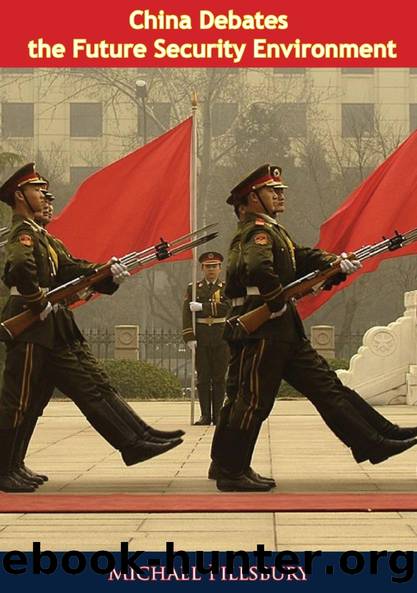China Debates the Future Security Environment by Michael Pillsbury National Defense University

Author:Michael Pillsbury, National Defense University [Michael Pillsbury, National Defense University]
Language: eng
Format: epub
ISBN: 9781839747502
Barnesnoble:
Publisher: Barakaldo Books
Published: 2021-05-03T00:00:00+00:00
Economic Rivalries
While Li Qingshan views the component factors of CNP from the perspective of their relevance to warfare, authors Tong Fuquan and Liu Yichang analyze them with more economic issues in mind. Tong and Liuâs interest in evaluating and comparing countriesâ CNP stems from the role it plays in world conflicts and rivalries over âscience and technology, industrialization, foreign trade, finance, and natural resources.â{517} They divide CNP into four major partsâeconomics, politics, science and technology, and military affairsâplacing economics in the most crucial position. âActual economic strength,â they write, âis, of course, the major component part of Comprehensive National Power, and to a certain extent, a countryâs actual economic strength represents its Comprehensive National Power.â The other three areas are not discussed as independent factors but with regard to their relationship to economics.
Concerning politics, Tong and Liu write, âIn general, political power and actual economic strength are linked together.â{518} They believe a country with strong economic power will have powerful political influence, and a nation with unsubstantial economic strength will not have major political influence. However, they do grant an exception for Japan, whose great economic strength does not translate into a strong role in international political affairs. A similar relationship exists between the extent of a countryâs economic strength and the level of its scientific and technological development. While the authors recognize the importance of military power, they assess it based on its connection to the other factors:
Actual military strength also is an area that can not be lacking in Comprehensive National Power, if a countryâs military power is not strong, it is out of the question that this country could have powerful Comprehensive National Power. In general, the size of military expenditures is both a reflection of whether a countryâs actual military strength is strong or weak, and an important sign of whether its economy is powerful, additionally, the development of military technology is related to actual scientific and technological strength. Therefore, in a certain sense, the enhancement of actual military strength is a strong symbol of a countryâs powerful Comprehensive National Power.{519}
Download
This site does not store any files on its server. We only index and link to content provided by other sites. Please contact the content providers to delete copyright contents if any and email us, we'll remove relevant links or contents immediately.
| Central Asia | Southeast Asia |
| China | Hong Kong |
| India | Japan |
| Korea | Pakistan |
| Philippines | Russia |
The Sympathizer by Viet Thanh Nguyen(4384)
The Rape of Nanking by Iris Chang(4202)
World without end by Ken Follett(3474)
Ants Among Elephants by Sujatha Gidla(3460)
Blood and Sand by Alex Von Tunzelmann(3194)
Japanese Design by Patricia J. Graham(3163)
The Queen of Nothing by Holly Black(2586)
City of Djinns: a year in Delhi by William Dalrymple(2547)
Foreign Devils on the Silk Road: The Search for the Lost Treasures of Central Asia by Peter Hopkirk(2454)
India's Ancient Past by R.S. Sharma(2450)
Inglorious Empire by Shashi Tharoor(2436)
Tokyo by Rob Goss(2427)
In Order to Live: A North Korean Girl's Journey to Freedom by Yeonmi Park(2377)
Tokyo Geek's Guide: Manga, Anime, Gaming, Cosplay, Toys, Idols & More - The Ultimate Guide to Japan's Otaku Culture by Simone Gianni(2360)
India's biggest cover-up by Dhar Anuj(2349)
The Great Game: On Secret Service in High Asia by Peter Hopkirk(2329)
Goodbye Madame Butterfly(2249)
Batik by Rudolf Smend(2179)
Living Silence in Burma by Christina Fink(2060)
